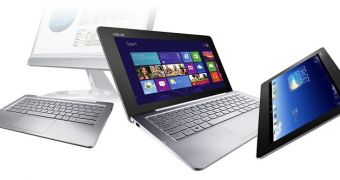ASUS has launched the Transformer Book Trio in several markets around the world including Europe, Japan and Australia. But so far, the company has been skittish about bringing the 3-in-1 hybrid to US lands.
The Trio was spotted going through the FCC in September and now it seems to have made another appearance there, showing a slight change in wireless radio functionalities. This suggests that the device might be finally getting ready to show up on American retail shelves.
The convertible was unveiled back in June at Computex, just so it can show up again at the IFA trade show in Berlin, before being rolled out in selected markets, from which the US was excluded.
It’s a real shame that American consumers have been deprived of this versatile convertible. The Transformer Book Trio is available for use in three different modes and runs two operating systems, depending on how customers use the device.
For starters, the device can be handled as a tablet which only weighs 680 g / 1.5 pounds and runs the Android operating system. When used in tablet mode, power comes from an Intel Clover Trail+ processor coupled with 2GB of RAM. 16GB of internal storage are provided onboard.
By attaching the keyboard to the screen, customers get to use the device as a laptop. Granted, the product becomes a little bulkier now weighing 1.8 kg / 4 pounds, but it still remains pretty mobile. ASUS has added an Intel Haswell processor with 4GB of RAM. There’s also a 500GB HDD on board. As a notebook, the Transformer runs Windows 8 instead.
The third mode implies taking away the keyboard and connecting it to an external monitor, in order to get a real desktop-like experience.
The Transformer Book Trio features an 11-inch screen with a resolution of 1920 x 1080 pixels. Other functionalities include Bluetooth, Wi-Fi, USB, audio and video ports. There’s an expected battery life of 5 hours for the hybrid, which, oddly enough, is not much, when compared to other Haswell devices.

 14 DAY TRIAL //
14 DAY TRIAL //